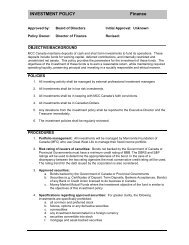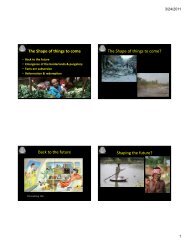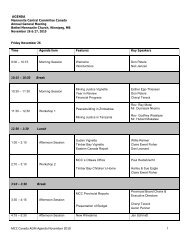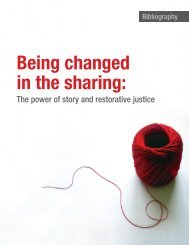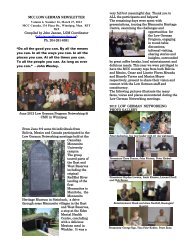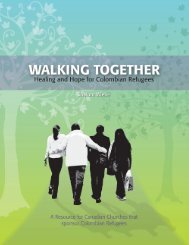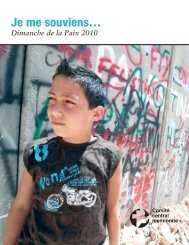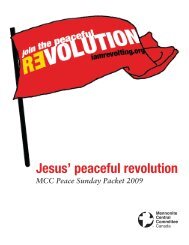Remembrance Day Peace Packet for teachers - Mennonite Central ...
Remembrance Day Peace Packet for teachers - Mennonite Central ...
Remembrance Day Peace Packet for teachers - Mennonite Central ...
You also want an ePaper? Increase the reach of your titles
YUMPU automatically turns print PDFs into web optimized ePapers that Google loves.
<strong>Remembrance</strong> <strong>Day</strong> <strong>Peace</strong> <strong>Packet</strong> <strong>for</strong> <strong>teachers</strong><br />
November 2010<br />
®<br />
<strong>Mennonite</strong><br />
<strong>Central</strong><br />
Committee<br />
Canada
<strong>Remembrance</strong> <strong>Day</strong> <strong>Peace</strong> <strong>Packet</strong><br />
<strong>for</strong> Teachers<br />
Dear Teacher,<br />
<strong>Remembrance</strong> <strong>Day</strong> is an annual occasion when our country invites us to remember and honour<br />
the men and women who have served, and continue to serve, through the Canadian Forces.<br />
<strong>Mennonite</strong> <strong>Central</strong> Committee is the relief, development and peace organization of <strong>Mennonite</strong><br />
and Brethren in Christ churches in Canada. <strong>Mennonite</strong>s and Brethren in Christ are considered<br />
‘historic peace churches’ who resist participation in war and military service.<br />
Each year, at <strong>Remembrance</strong> <strong>Day</strong>, MCC provides a packet of materials to supporting churches<br />
across the country to help them observe <strong>Peace</strong> Sunday. <strong>Peace</strong> Sunday is an occasion when<br />
congregations remind themselves of the biblical call to be people of peace and to resist war and<br />
violence.<br />
Over the years, a number of public school <strong>teachers</strong> have contacted MCC <strong>for</strong> ideas to help them<br />
plan <strong>Remembrance</strong> <strong>Day</strong> observances in their schools. These <strong>teachers</strong> are looking <strong>for</strong> ideas that<br />
will encourage remembrance of all those who suffer through war, that promote nonviolent<br />
peacemaking, and that instil empathy and a sense of common humanity with others, even<br />
enemies. This simple packet is an attempt to provide some suggestions.<br />
In this packet you will find suggestions from <strong>teachers</strong> who have experimented with alternative<br />
<strong>Remembrance</strong> <strong>Day</strong> observances in their schools. You will find a list of pertinent MCC resources.<br />
You will also find suggestions <strong>for</strong> books and <strong>for</strong> audio-visuals available through a variety of<br />
<strong>Mennonite</strong> resource centres.<br />
We hope that you will find this resource useful. We would appreciate your feedback, as well as<br />
your own suggestions <strong>for</strong> incorporation into an expanded teacher’s resource next year.<br />
For a world at peace,<br />
Esther Epp-Tiessen<br />
<strong>Peace</strong> Program Coordinator<br />
MCC Canada<br />
peace@mennonitecc.ca<br />
<strong>Remembrance</strong> <strong>Day</strong> <strong>Peace</strong> <strong>Packet</strong> <strong>for</strong> Teachers 1
Table of Contents<br />
1. Suggestions from Teachers<br />
2. MCC Resources<br />
3. Books and audio-visuals resources from <strong>Mennonite</strong> Church Canada<br />
Resource Centre<br />
4. Audio-visuals resources from <strong>Mennonite</strong> and Brethren in Christ<br />
Resource Centre<br />
5. Websites<br />
<strong>Remembrance</strong> <strong>Day</strong> <strong>Peace</strong> <strong>Packet</strong> <strong>for</strong> Teachers 2
1. Suggestions from Teachers<br />
A Ceremony of <strong>Remembrance</strong>, Maple High School, Toronto, Ontario, by Jeff Taylor<br />
Good morning Maple staff and students. Each year on the 11 th day of the 11 th month at the 11 th hour<br />
Canadians mark the moment when the First World War mercifully came to a close, releasing more than<br />
half a million Canadians from military service, and leaving more than 60,000 dead in Europe. Canadians<br />
traditionally remember fallen soldiers from all wars at this time. Now we will remember them in a brief<br />
ceremony.<br />
We begin with the reading of the famous poem by Canadian soldier and doctor, Lieutenant Colonel John<br />
McCrae, “In Flanders Fields.”<br />
<strong>Remembrance</strong> <strong>Day</strong> <strong>Peace</strong> <strong>Packet</strong> <strong>for</strong> Teachers 3
[very brief pause]<br />
We remember Lt. John McCrae, soldier, poet and healer: a physician enraged by the madness of what<br />
was then the world’s most deadly war ever, he could not then see any other way but to ask us to take<br />
up his quarrel with his enemy. Now freed from bonds of time and space, now seeing all things clearly,<br />
perhaps he would ask us to take up an even brighter torch, to battle an even more deadly foe: to take<br />
up the torch of peace, to do battle with all that separates brother from brother, sister from sister.<br />
We remember John McCrea and all Canadian boys and men who served in battle in the face of great<br />
danger and fear. We remember their lives, and also the lives of German boys and Japanese men: we<br />
remember that their lives were cut short by the ignorance, hate, and foolishness of those on all sides<br />
who sent them into battle. We remember who they were and who they might have become.<br />
We remember, as well, all who faced battle unarmed: innocent civilians on all sides and in all places and<br />
in all times who have suffered and died undeservedly. We remember those who faced social scorn and<br />
prison as peacemakers – whose only weapon was the radical idea that all lives are equally precious; and<br />
that all violence represents a failure of human imagination ‐‐ a triumph of fear over reason, of doubt<br />
over faith. We remember the innocent lost to war.<br />
We remember those still living but caught in the vortex of war even now: children taken from their<br />
mothers’ arms and <strong>for</strong>ced into battle. We remember those who, in good faith, serve as UN<br />
peacekeepers around the world. May they and those they guard be kept safe. We remember Canadian<br />
men and women in extreme peril in Afghanistan: may they and all the people of Afghanistan be kept<br />
safe and soon know peace.<br />
We are grateful to live in a free democracy and we remember all who have suffered as soldiers, as<br />
peacemakers, and as innocent victims of war, hoping to make and keep Canada free and at peace.<br />
We remember all those dead and now in danger, armed and unarmed, and we hope <strong>for</strong> their peace, <strong>for</strong><br />
peace <strong>for</strong> our country, and <strong>for</strong> peace <strong>for</strong> our shared world.<br />
Let us now stand out of respect <strong>for</strong> those we remember.<br />
[very brief pause]<br />
Now, in silence, we remember . . .<br />
[about 30 seconds of silence]<br />
[recording of The Last Post]<br />
This concludes our ceremony of remembrance.<br />
<strong>Remembrance</strong> <strong>Day</strong> <strong>Peace</strong> <strong>Packet</strong> <strong>for</strong> Teachers 4
2. MCC Resources<br />
MCC has many peace resources. For <strong>Remembrance</strong> <strong>Day</strong>, we list only a few. You are encouraged<br />
to consult the following websites <strong>for</strong> additional suggestions:<br />
http://canada.mcc.org/peace/resources<br />
http://www.tng-secure.com/scripts/mcc/catalog/ (resources available <strong>for</strong> loan)<br />
http://secure.mcc.org/mccstore/index.phpmain_page=index&cPath=5 (resources available<br />
<strong>for</strong> purchase)<br />
A. <strong>Peace</strong> buttons : “to remember is to work <strong>for</strong> peace”<br />
Over twenty years ago, a group of <strong>Mennonite</strong>s in Ontario developed the idea <strong>for</strong> this button.<br />
This button was created <strong>for</strong> the purpose of offering a positive peace message during<br />
<strong>Remembrance</strong> <strong>Day</strong> season. Wear it together with or instead of a poppy.<br />
B. “I remember”<br />
This 3-minute video invites viewers to remember all people who are harmed by war.<br />
C. “Je me souviens….I remember….”<br />
This is a document about victims of war: refugees, orphaned children, abused women and girls,<br />
separated families, people who are hungry, etc. Use this material to talk about the devastating<br />
impact of war and the importance of finding alternatives to war.<br />
D. “<strong>Peace</strong> is a choice… At each small turn choose peace.”<br />
This colourful postcard identifies 10 practices that represent choosing peace: speaking truth,<br />
valuing diversity, imagining a peaceful world.” Order from MCC store<br />
E. “Is it time to choose your own adventure”<br />
This 12-page zine <strong>for</strong> teenagers identifies ten things to think about be<strong>for</strong>e enlisting. Order from<br />
MCC Canada or MCC Ontario<br />
F. “Down by the riverside”<br />
This 3-minute video responds to that old song "Study War No More" (Gonna lay down my<br />
sword and shield down by the riverside and study war no more). Great song, but it begs the<br />
<strong>Remembrance</strong> <strong>Day</strong> <strong>Peace</strong> <strong>Packet</strong> <strong>for</strong> Teachers 5
question: If we're not going to study war, then what WILL we study This video is a response to<br />
the question.<br />
G. “The guts of peacemaking”<br />
This 3‐minute video takes the vantage point of a helicopter pilot who finds the guts of<br />
peacemaking. Students at Rockway <strong>Mennonite</strong> Collegiate in Kitchener, Ontario helped to make<br />
this video.<br />
H. “Choosing a career in the military”<br />
This 3‐minute video captures two people talking about military training and what it is about.<br />
The viewer wondering what military training is all about. Then an idea emerges about<br />
alternatives to violence. Students at Conrad Grebel University College in Waterloo, Ontario<br />
helped to make this video.<br />
I. “<strong>Peace</strong> Parts Toolkit”<br />
This toolkit strives to introduce to the breadth of MCC's work in justice and peace‐building. It<br />
includes five‐lesson curricula <strong>for</strong> youth/adults and <strong>for</strong> children. Available to own or borrow<br />
from your nearest MCC Office or try the online store.<br />
<strong>Remembrance</strong> <strong>Day</strong> <strong>Peace</strong> <strong>Packet</strong> <strong>for</strong> Teachers 6
3. Books and audio‐visuals available <strong>for</strong> loan through <strong>Mennonite</strong><br />
Church Canada Resource Centre<br />
The following list of materials has been prepared by Arlyn Friesen Epp, director of the<br />
<strong>Mennonite</strong> Church Canada Resource Centre, Winnipeg, Manitoba.<br />
For the complete listing of peace resources at <strong>Mennonite</strong> Church Canada Resource Centre, click<br />
here. (Loan policy and fees apply.)<br />
A. Children’s Picture Books (elementary age)<br />
Let’s Make a Garden by Tamara Awad Lobe, Herald Press, 1995. Brown beans from Mexico<br />
grow beside an orange tree from Swaziland, as boys and girls from 11 nations make a garden.<br />
Xiau Liu from China brings rice, Nirmala from India offers spices, and Hans from Holland<br />
provides bright red tulips. Creative illustrations bring alive this story of hope.<br />
Enemy Pie by Derek Munson and Tara Calahan King, Chronicle Books, 2000. In this funny yet<br />
endearing story, one little boy learns an effective recipe <strong>for</strong> turning a best enemy into a best<br />
friend. With charming illustrations that bring to life the difficulties and ultimate rewards of<br />
making new friends, Enemy Pie serves up a sweet lesson in friendship.<br />
If You Choose Not to Hit: A Dozen Skills that Make Kids Powerful Problem‐Solvers by Kathy<br />
Beckwith and Carol Henderson, Educational Media, 2001. Children can learn a better way of<br />
problem solving if they are encouraged to do it, shown how to do it, and see that it really<br />
works. In this delightfully illustrated book, elementary age children will find other kids who deal<br />
effectively with real‐life, challenging scenarios.<br />
And to Think that We Thought that We’d Never Be Friends by Mary Ann Hoberman and Kevin<br />
Hawkes, Crown Publishers, 1999. In rhyming verse that's a deliberate homage to Dr. Seuss,<br />
poet and picture book author Mary Ann Hoberman takes on quarreling and its consequences,<br />
and shows how turning fighters into friends leads to greater peace.<br />
The Golden Rule by Ilene Cooper and Gabi Swiatkowska, Abrams Books <strong>for</strong> Young Readers,<br />
2007. The Golden Rule can be found in all the world's religions and in every culture. It's easy to<br />
say and to remember, but what does it really mean And how can you live by it Ilene Cooper's<br />
universal story, with rich, evocative paintings by Gabi Swiatkowska captures the importance<br />
and rewards of a rule that is simple yet not always easy to follow.<br />
Potatoes, Potatoes by Anita Lobel, Greenwillow Books, 2004. There was once an old woman<br />
who had a potato farm and two hardworking, loving sons. But one day one son ran away to the<br />
army of the east; the other son joined the army of the west. Anita Lobel tells a powerful story<br />
<strong>Remembrance</strong> <strong>Day</strong> <strong>Peace</strong> <strong>Packet</strong> <strong>for</strong> Teachers 7
of two brothers who become enemies at war, and their wise mother whose cleverness turns<br />
fighting into peace.<br />
Playing War by Kathy Beckwith and Lea Lyon, Tilbury House, 2005. One hot summer day Luke<br />
and his friends decide to play their favourite game of war, using sticks <strong>for</strong> guns and pine cones<br />
<strong>for</strong> bombs and grenades. When a new child in the neighborhood hesitates to join in and then<br />
tells them he has been in a real war in the country where he used to live, the other children<br />
start to see their game in a new light.<br />
What if the Zebras Lost Their Stripes By John Reitano and William Haines, Paulist Press, 1998.<br />
If the zebras lost their stripes and became different from one another, some white and some<br />
black, would they turn and fight each other and stop living life as loving friends Both<br />
entertaining and eye‐opening, the book allows all readers‐young and old alike‐to imagine the<br />
possibilities of a world without prejudice.<br />
Feathers and Fools by Mem Fox and Nicholas Wilton, Voyager Books, 2000. A poignant story<br />
that highlights the arbitrariness of perceived differences that lead to fear, and the real<br />
possibilities of friendship, based on shared commonalities.<br />
The Sun and the Wind retold by Cornelia Lehn, Faith and Life Press, 1983. An Aesop fable<br />
retold by Cornelia Lehn in simple language. What is more powerful, the <strong>for</strong>ce of the wind or the<br />
warmth of the sun<br />
Say Something by Peggy Moss and Lea Lyon, Tilbury House, 2004. At this school, there are<br />
some children who push and tease and bully. Sometimes they hurt other kids by just ignoring<br />
them. The girl in this story sees it happening, but she would never do these mean things herself.<br />
Then one day something happens that shows her that being a silent bystander isn’t enough.<br />
Will she take some steps on her own to help another kid<br />
I Can Show You I Care: Compassionate Touch <strong>for</strong> Children by Susan Cotta and Gregory<br />
Craw<strong>for</strong>d, North Atlantic Books, 2003.This illustrated children's book attempts to give children a<br />
sense of control and hope by empowering them with a simple act of kindness: gentle touch ‐ a<br />
safe, compassionate touch. This touch, innate to many of us, has been largely ignored and even<br />
<strong>for</strong>bidden in some schools and health care settings. This lack of touch is changing children: they,<br />
like all of us, need touch to survive. This kind of touch is a key to eliminating violence in the<br />
home, schools, on the streets, and yes, in the world.<br />
B. Resources <strong>for</strong> Older Children (Upper elementary‐middle school)<br />
Plant a Seed of <strong>Peace</strong> by Rebecca Seiling and Brooke Rothshank, Herald Press, 2007. Fortythree<br />
delightfully illustrated stories of peacemakers from today and the past will capture the<br />
imagination of children of all ages. They tell of people whose lives point to something beyond<br />
<strong>Remembrance</strong> <strong>Day</strong> <strong>Peace</strong> <strong>Packet</strong> <strong>for</strong> Teachers 8
themselves‐‐a trans<strong>for</strong>ming faith in God. Readers learn how to put their faith into action so<br />
they too can grow a better world.<br />
<strong>Peace</strong>ful Heroes by Jonah Winter and Sean Addy, Scholastic, 2009. Why is "hero" a word so<br />
often reserved <strong>for</strong> warriors who fight with guns and weapons to defend their people<br />
Renowned picture book biographer Jonah Winter writes a series of remarkable stories about<br />
the bravest people history has known who are willing to die <strong>for</strong> a cause, but never to kill <strong>for</strong> a<br />
cause.<br />
Alia’s Mission: Saving the Books of Iraq by Mark Alan Stamaty, Random House, 2004. Inspired<br />
by a true story, Alia's Mission is the dramatic account of Alia Muhammad Baker, the chief<br />
librarian of the <strong>Central</strong> Library in Basra, Iraq, who undertook a mission of epic proportions. Told<br />
in dramatic graphic‐novel panels by renowned cartoonist Mark Alan Stamaty, Alia's Mission<br />
celebrates the importance of books and the freedom to read while examining the impact of war<br />
on a country and its people.<br />
Three Wishes Palestinian and Israeli Children Speak by Deborah Ellis, Groundwood Books,<br />
2004. The war in the Middle East has been going on <strong>for</strong> so long, and in so many <strong>for</strong>ms, that it<br />
often seems as if it will continue <strong>for</strong>ever. But war, like almost everything else humans do, is a<br />
choice. The children in this book talk about how the choices other people have made have<br />
affected their lives.<br />
C. Resources <strong>for</strong> Teachers<br />
Hope Indeed! Remarkable Stories of <strong>Peace</strong>makers by N. Gerald Shenk, Good Books, 2008.<br />
Hope Indeed! is his collection of stories of stunningly ordinary people behaving with<br />
extraordinary hope.<br />
The Little Book of Restorative Discipline <strong>for</strong> Schools by Lorraine Stutzman Amstutz and Judy H.<br />
Mullet, Good Books, 2005. Two educators offer applications and models of restorative justice<br />
applied to the school classroom and cafeteria. Among them are class meetings <strong>for</strong> 5th graders;<br />
reintegration of 7th and 8th graders who were suspended; circle processes, which offer space<br />
<strong>for</strong> all voices to be heard, and also calm tensions that are building; and community<br />
conferencing when trouble shapes up between students and neighbors.<br />
The Bully, the Bullied, and the Bystander: From Pre‐School to High School – How Parents and<br />
Teachers can help Break the Cycle of Violence by Barbara Coloroso, HarperCollins, 2002. Some<br />
bullying victims have fought back with violence that has shattered entire communities; others<br />
have committed suicide; many more suffer in silence, their lives a constant round of emotional<br />
and physical pain. This book gives parents, caregivers, educators ‐ and, most of all, kids ‐ the<br />
tools they need to break this devastating cycle of violence.<br />
<strong>Remembrance</strong> <strong>Day</strong> <strong>Peace</strong> <strong>Packet</strong> <strong>for</strong> Teachers 9
Children and War, Children and <strong>Peace</strong>: Through Innocent Eyes by Project <strong>Peace</strong>makers, 2001.<br />
A curricula <strong>for</strong> <strong>teachers</strong> including worksheets, overhead transparencies, simulation game,<br />
poster and a video "Through Innocent Eyes." The video tells the stories of children caught in the<br />
brutal reality of adult warfare. At the same time, another story is also told: story of hope and<br />
renewal, of people actively working to build peace and justice.<br />
Fostering Friendships: A Study Guide to Iraq – For Elementary and Middle School Teachers by<br />
American Friends Service Committee, 2000. This study guide is an attempt to provide <strong>teachers</strong><br />
with some tools to use in teaching about Iraq, the Middle East, and peacemaking. The aim is to<br />
humanize a people that has been dehumanized by war, the continuing sanctions, the media,<br />
and the stereotypes of Arabs that exist in this country.<br />
Raising <strong>Peace</strong>ful Children in a Violent World by Nancy Lee Cecil, Lura Media, 1995. An action<br />
book <strong>for</strong> parents and <strong>teachers</strong> who want to end violence and create a safe, peaceful<br />
environment <strong>for</strong> children ‐ in the home, in school, and in the community. Brimming with<br />
creative suggestions and down‐to‐earth examples <strong>for</strong> teaching children to become<br />
peacemakers.<br />
Go with <strong>Peace</strong>: Enriching the Lives of Children through the Pursuit of <strong>Peace</strong> <strong>for</strong> All by Kelly<br />
Guinan, Kind Regards, 2005. A comprehensive collection of exercises <strong>for</strong> children to build<br />
feelings of inner peace and also to build their skills <strong>for</strong> making peace with others. This book has<br />
a great deal to offer <strong>teachers</strong> and parents.<br />
<strong>Remembrance</strong> <strong>Day</strong> <strong>Peace</strong> <strong>Packet</strong> <strong>for</strong> Teachers 10
4. Audio-visuals available <strong>for</strong> loan through the <strong>Mennonite</strong><br />
and Brethren in Christ Resource Centre<br />
The following list of DVDs has been prepared by Christine Derstine, manager / librarian<br />
of the <strong>Mennonite</strong> and Brethren in Christ Resource Centre (MBICRC), Kitchener, Ontario.<br />
<strong>Mennonite</strong> and Brethren in Christ Resource Centre<br />
50 Kent Ave., Kitchener, ON, N2G 3R1<br />
519-745-8458 x.225<br />
For the complete listing of peace resources at MBICRC, click here. View subject category<br />
on right hand column. (Loan policy and fees apply.)<br />
A. Videos <strong>for</strong> Senior High School Students<br />
(Teachers should preview DVD be<strong>for</strong>e showing it to their classes.)<br />
Force More Powerful. A six part documentary series concerning one of the 20th<br />
century's most important and least-known stories - how nonviolent power overcame<br />
oppression and authoritarian rule. The DVD includes stories from six different countries:<br />
South Africa, USA, India, Denmark, Poland and Chile. (154 minutes)<br />
Confronting the Truth. This film shows how countries which have experienced massive<br />
human rights violations have created official, independent bodies known as truth<br />
commissions. Since 1983, truth commissions have been established in over 20<br />
countries, in all parts of the world. Confronting the Truth documents the work of truth<br />
commissions in South Africa, Peru, East Timor, and Morocco. Taking testimony from<br />
victims and perpetrators, and conducting detailed investigations; truth commissions<br />
create a historical record of abuses that have often remained secret. They identify<br />
patterns of abuse, structural and institutional weaknesses, societal and cultural<br />
problems, and weak legal systems that made the violations possible. To remedy these<br />
faults, they recommend governmental, societal and legal re<strong>for</strong>ms to address the pain of<br />
the past, to safeguard human rights and due process, and to ensure that the horror will<br />
not be repeated. (73 minutes)<br />
Bringing Down a Dictator. In the year 2000, Slobodan Milosevic fought to hold power<br />
in Yugoslavia. He controlled an army, the police <strong>for</strong>ce, and most of the news media. But<br />
he underestimated his opponents, a group of students who attacked the regime with<br />
ridicule, rock music, and a willingness to be arrested. The students were the beginning<br />
of a human rights and pro-democracy movement which seized parliament and<br />
extradited Milosevic <strong>for</strong> war crimes. The courage of hundreds of thousands of Serbs led<br />
to non-violent change. (56 minutes)<br />
<strong>Remembrance</strong> <strong>Day</strong> <strong>Peace</strong> <strong>Packet</strong> <strong>for</strong> Teachers 11
Encounter Point. This documentary tells the story of an Israeli settler, a Palestinian exprisoner,<br />
a bereaved Israeli mother and a wounded Palestinian bereaved brother who<br />
risk their safety and public standing to press <strong>for</strong> an end to the conflict. These people<br />
participate in the Forum <strong>for</strong> Bereaved Israeli and Palestinian Families, a grassroots peace<br />
ef<strong>for</strong>t. The work of the Forum is to explain the complex situation working <strong>for</strong><br />
nonviolence and peace and is not interested in taking sides. (52 minutes)<br />
Pray the Devil Back to Hell. This film is the extraordinary story of a small band of<br />
Liberian women who – armed only with white T-shirts and the courage of their<br />
convictions – came together in the midst of a bloody civil war, took on the warlords, and<br />
brought peace to their shattered country as peace talks faced collapse. The women of<br />
Liberia – Christian and Muslims united – <strong>for</strong>med a thin but unshakable white line<br />
between the opposing <strong>for</strong>ces, and successfully demanded an end to the fighting. Faced<br />
with eviction, they invoked the most powerful weapon in their arsenal – threatening to<br />
remove their clothes. It worked. The women of Liberia are living proof that moral<br />
courage and non-violent resistance can succeed, even where the best ef<strong>for</strong>ts of<br />
traditional diplomacy have failed to being lost to historical. Pray the Devil Back to Hell<br />
reconstructs the moment through interviews, archival footage and striking images of<br />
contemporary Liberia. (72 minutes)<br />
<strong>Remembrance</strong> <strong>Day</strong> <strong>Peace</strong> <strong>Packet</strong> <strong>for</strong> Teachers 12
5. Websites<br />
A. Alternative Service<br />
Conscientious objectors (COs) are individuals, who because of convictions related to religion or<br />
conscience, refuse to participate in war. This web site focuses on conscientious objectors and<br />
the alternative service they per<strong>for</strong>med in Canada during World War II. It suggests that COs<br />
deserve to be remembered <strong>for</strong> the way in which they demonstrated an alternative to war.<br />
The website is designed <strong>for</strong> use in classrooms across Canada. It uses original records, also<br />
known as primary sources, such as pictures, tape recordings, movies, letters, journals, and<br />
documents not otherwise available in libraries. The digitization of this unique material makes it<br />
accessible to a wide range of people. Each section of the website includes specific classroom<br />
suggestions <strong>for</strong> <strong>teachers</strong>. Alternativeservice.ca is a project of the <strong>Mennonite</strong> Heritage Centre in<br />
Winnipeg, Canada.<br />
B. People Power<br />
People Power is a video game about politics, about strategy and about social change. As a<br />
leader of a popular movement you resist adversaries who control the police, the army and<br />
bureaucracy, even the media. Your “weapons” are your strategic skill and ingenuity. People<br />
Power is a game, as well as an opportunity to join a community of others who want to learn<br />
about civil resistance and nonviolent strategies.<br />
<strong>Remembrance</strong> <strong>Day</strong> <strong>Peace</strong> <strong>Packet</strong> <strong>for</strong> Teachers 13



